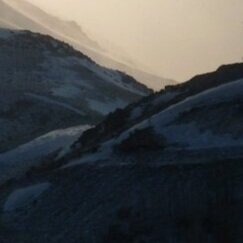Marius van Hoogstraten is a Mennonite academic and preacher in Amsterdam and Frankfurt
Thinking the fault lines of religion, society, and the planet
I work as a lecturer at the Mennonite Seminary (Vrije Universiteit Amsterdam), connected to the Visiting Chair for Inventive Theology. I am also an affiliate researcher at the Luxembourg School of Religion & Society.
In my research, I am particularly interested in the question what it means to live well together in times of crisis, collapse, and catastrophe. What existential attitude and what kind of faith can call us to be present to each other, and to nonhuman life, in such circumstances? The question here - at least as I see it - is not just what we should be doing, or how to have hope, or indeed how to avert catastrophe, but how to live well, with justice and kindness and fellowship in its midst. A little book of mine is coming out this year in which I read the 1527 Anabaptist text known as the Schleitheim Confession in this light. In conversation with Schleitheim, I suggest this is a political (or ecclesio-political) question before all else: At stake is the fundamental shape of our togetherness and how it enables, shapes, and regulates tangible spaces of freedom amidst a relatedness to nonhuman life. (Community and Catastrophe: An Ecclesio-Political Reading of the Schleitheim Confession, T&T Clark, expected 2025).
In my dissertation, Theopoetics and Religious Difference, I looked towards the work of Richard Kearney, John D. Caputo, and Catherine Keller as possible resources for embracing the “unruliness” of religious difference. It has been published with Mohr Siebeck (2020).
See a full list of my publications in my CV or on my Academia.edu page.
A Kingdom of dinner parties and buried treasure
I serve as a preacher in Mennonite congregation of Frankfurt am Main. Come by some time — we could get lunch afterwards, if you’d like to talk. Mennonites are a small, global, and decentralized denomination with roots in the radical reformation of the sixteenth century. In its own way, our congregation is a progressive and welcoming community.
But being Church together is more than Sunday service, and the Kingdom of God is stranger and more wonderful than we could ever fit into a liturgy. I’ve found that God will meet us in the deeply familiar, the traditions and places where we are most at home — but will also seek us out especially where we are strange, and will call for us in the unusual and unexpected. I find my pastoral work most meaningful when those two connect, those liminal moments in our lives where the new reaches into the old, where the divine embraces the earthy and creaturely, and we are transformed.
These liminal moments can especially include both the celebration of love and the mourning of loss. If you are looking for someone to walk with you in such times, do send me an email to discuss what role I can play.
Photos (from top): moin.photo; David Bertsche; Paul Gauguin: Vision after the Sermon (1888; Scottish National Gallery)





